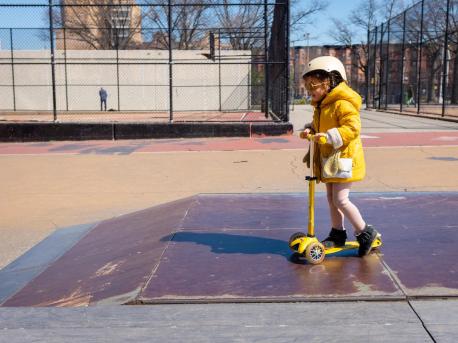
UNICEF's Child Friendly Cities Initiative Comes to the U.S.
UNICEF's Child Friendly Cities Initiative puts children's rights front and center in public policy.
UNICEF USA is proud to announce that UNICEF's Child Friendly Cities Initiative is now in the United States.
Created in 1996, UNICEF’s Child Friendly Cities Initiative (CFCI) uses a child rights framework, based on the Convention on the Rights of the Child, to build a roadmap for establishing safe, equitable, just, inclusive and child-responsive cities and communities around the world. Since its inception, CFCI has been adopted in over 3,000 municipalities in 40 countries.
UNICEF's Child Friendly Cities Initiative uses a child rights framework to improve cities and communities
Our initial pilot will include Houston; Minneapolis; San Francisco and Prince George’s County, Md. This first cohort will work with UNICEF USA to implement an ambitious, two-year process toward recognition as a UNICEF Child Friendly City.
Minneapolis has a long history of working for the well-being of children and families," says Minneapolis Health Commissioner Gretchen Musicant. "Being a pilot city with CFCI brings a new accountability, engages new partners and will add new strategies to our work.
At its heart, CFCI empowers local leaders to take action on priorities for children and young people, with input from children and young people themselves, and residents of the community. Each city will establish goals related to five broad categories: safety and inclusion, children’s participation, equitable social services, safe living environments, and play and leisure.
Profound structural inequalities exacerbated by COVID-19 and institutionalized racism call for new approaches to addressing root causes
At this painful time when profound structural inequalities have been exacerbated by COVID-19 and deadly examples of institutionalized racism have permeated our culture, many of us are searching for new approaches to addressing the root causes. UNICEF believes that the road to lasting transformation begins with children.
We know that youth represent 25% of our population, but are 100% of our future. When we make our communities better places for children, we make them better places for all.
Top photo: Margot, 4, rides her scooter in a New York City park on March 26, 2020. © UNICEF/UNI316259/Bajornas
HOW TO HELP
There are many ways to make a difference
War, famine, poverty, natural disasters — threats to the world's children keep coming. But UNICEF won't stop working to keep children healthy and safe.
UNICEF works in over 190 countries and territories — more places than any other children's organization. UNICEF has the world's largest humanitarian warehouse and, when disaster strikes, can get supplies almost anywhere within 72 hours. Constantly innovating, always advocating for a better world for children, UNICEF works to ensure that every child can grow up healthy, educated, protected and respected.
Would you like to help give all children the opportunity to reach their full potential? There are many ways to get involved.





